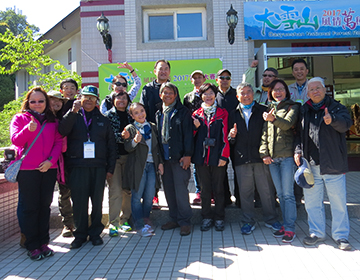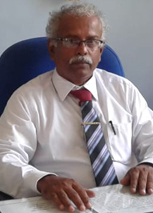International Firefly Symposium and the International Conference hosted by Taiwan Ecotourism Association (TEA)


Sri Lanka Ecotourism Foundation has been invited by Taiwan Ecotourism Association (TEA) to take part at two important events held in Taipei City, Taiwan from 23rd -30th April, 2017, supported by Ministry of Tourism, Taiwan. On the 24th April, International Firefly Symposium (IFS) was held at Taipei Zoo, a rare learning opportunity on ‘Firefly Tourism’, which focused on ecotourism niche market segments. The other important events were the celebrations of declaring 2017 as the “Ecotourism Year of Taiwan (YET) and the International Ecotourism Conference hosted by the TEA to support ecotourism promotions in Taiwan. Many academics and scholars from all over the world attended these events. Palitha Gurusinghe, President, Sri Lanka Ecotourism Foundation (SLEF) and Founding Deputy Chairman of Asian Ecotourism Network (AEN) has been invited by Taiwan Ecotourism Association (TEA) to attend these events and to make a Presentation on “Ecotourism Potential and Current Scenario of Sri Lanka Ecotourism” at the International Ecotourism Conference hosted by Taiwan Ecotourism Association (TEA) Taiwan is a small island of 36,000 SQ. KMS situated in the Northern Hemisphere. Due to the influence of tectonic movements and ice age, Taiwan has complicated terrain and high mountains. This feature, together with the fact that the Tropic of Cancer passes the middle of the island, creates different types of climate, such as tropical, sub-tropical, temperate, and sub-alpine zones. Myriads of animals and plants live here making this little island abound in ecological resources.
Palitha Gurusinghe, President, Sri Lanka Ecotourism Foundation
with Mr. Tan Ho-CHEN, the Minister of Tourism, Taiwan
The International Firefly Symposium (IFS) has been designed to bring together the firefly researchers around the world to exchange their professional experiences to update the participants with current research advances. IFS highlighted and disseminated very interesting scientific information hitherto unknown for the development and promotion of ecotourism through firefly watching. The audience was fascinated through the wondrous world of fireflies. Fireflies are also called Lightning Bugs. Named as they are nocturnal luminous of the beetle family Lampyridae, consisting of about 2,000 species that inhibit tropical and temperate regions According to the presentations delivered by the experts in the field “ firefly ecotourism is poised to take off all over the world within the next few years”. It’s already a popular activity in many Asian countries such as Japan, Taiwan, Thailand, Malaysia, Hong Kong, Singapore, Pacific-Islands etc. Over the past several decades, the synchronous fireflies that stretch out along the Mangroves and the Rivers of Thailand and Malaysia have spawned a thriving ecotourism industry. In Taiwan alone, the government has recently been promoting firefly ecotourism, and now each year over 100,000 visitors climb up into the Alishan mountains to view the summer and winter fireflies that thrive there. Visitors to firefly ecotourist sites in Nanacamilpa, Mexico have skyrocketed since 2014. In the United States, places like Elkmont, Tennessee and North Carolina’s Dupont State Forest are becoming increasingly popular destinations for their firefly-viewing.

Palitha addressing the Intentional Conferance in Taiwan
Fireflies are also called Lightning Bugs. Named as they are nocturnal luminous of the beetle family Lampyridae, consisting of about 2,000 species that inhibit tropical and temperate regions According to the presentations delivered by the experts in the field “ firefly ecotourism is poised to take off all over the world within the next few years”. It’s already a popular activity in many Asian countries such as Japan, Taiwan, Thailand, Malaysia, Hong Kong, Singapore, Pacific-Islands etc. Over the past several decades, the synchronous fireflies that stretch out along the Mangroves and the Rivers of Thailand and Malaysia have spawned a thriving ecotourism industry. In Taiwan alone, the government has recently been promoting firefly ecotourism, and now each year over 100,000 visitors climb up into the Alishan mountains to view the summer and winter fireflies that thrive there. Visitors to firefly ecotourist sites in Nanacamilpa, Mexico have skyrocketed since 2014. In the United States, places like Elkmont, Tennessee and North Carolina’s Dupont State Forest are becoming increasingly popular destinations for their firefly-viewing. However, there are issues and challenges of developing firefly ecotourism. Firefly Ecotourism brings hordes of people into natural areas that are often far too fragile. In the case of fireflies, artificial light must be minimized, as it can interfere with fireflies’ luminous courtship signals. Some firefly species have flightless females, and these easily get trampled by people walking through their habitat. To minimize harm to natural firefly populations, thoughtful habitat management needs to be combined with environmental education.

Palitha making a Presentation at the
Annual General Meeting of the Taiwan
Ecotourism Association
As humans, we have a long history of taking our natural resources completely for granted. All too often, we regretfully note their demise only after they have vanished. Great auks, giant sequoias, Alishan’s hinoki cedars, and Australia’s Great Barrier Reef are but a few of the treasures we’ve already lost. Maybe it’s time to pause a moment. Let’s decide what parts of the natural world we truly value. What kind of world do we want to leave for our children and our grandchildren? Then let’s get busy protecting those places and those creatures before it’s too late. As for the views of experts attended in IFS Fireflies many people remember fondly about the fireflies from their childhood. But those same fireflies may just be a distant memory for the next generation. Fireflies are starting to go the way of the dinosaurs and may soon disappear completely. Their numbers have begun to dwindle. For years, scientists have been sounding the alarm that the world’s 2000 species of fireflies are slowly starting to disappear. Unfortunately, scientists aren’t clear on exactly what is causing the disappearance of the fireflies. However, it is clear that human development is negatively affecting firefly populations.
Light Pollution
Fireflies use their glowing lights not only to entertain us but to communicate with one another, to find mates and to establish territory. When using their lights to communicate, the messages are often coordinated across large groups of thousands of fireflies. However, scientists have discovered that these large groups of fireflies can get out of sync when interrupted by other light sources such as streetlights, house lights and car headlights can all interfere and make it harder for fireflies to communicate. Human created light pollution can negatively affect fireflies to the point where mates are unable to find each other. Scientists believe this is one of the reasons why firefly numbers are dwindling. As an ecotourism activity, firefly watching is not very popular in Sri Lanka though millions of fireflies could be seen. In our neighboring countries, particularly in the South East Asian region, firefly watching is one of the most lucrative ecotourism business and recreations. According to the surveys and researches conducted, millions of fireflies could be seen in the grasslands and the mangrove population located in Uva, Sabaragamuwa, Central, North-Central, Western, Southern, Eastern, Northern and North-Western provinces of Sri Lanka. Firefly watching would contribute not only in generating tangible income for the rural communities of Sri Lanka but also would support to conserve sensitive strict nature reserves and the biodiversity.
Palitha making a Presentation at the Annual General Meeting of the
Taiwan Ecotourism Association
Sri Lanka has a tremendous potential to develop firefly watching as an ecotourism activity targeting high end ecotourists from all over the world. However, it is important that the promotional activities to be done under the strict supervision of the scientists and the experts of the field. During the IFS and the TEA International Conference, Sri Lanka Ecotourism Foundation has had lengthy discussion with IFS Secretariat and the experts and the scientists of some of the reputed Taiwan Universities who assured their fullest support to assist SLEF in promoting Ecotourism programmes in Sri Lanka. SLEF has been offered important Exchange Programmes on Ecotourism Experts between Taiwan and Sri Lanka. Since Taiwan has declared 2017 as the “Year of Ecotourism ” the Government and the Ecotourism Institutes exploring the possibility of collaborating with likeminded ecotourism organizations of other parts of the world.














